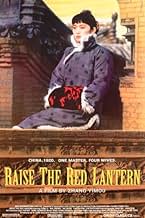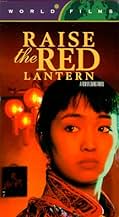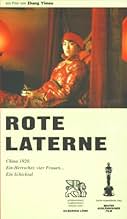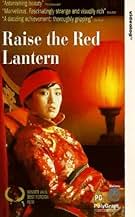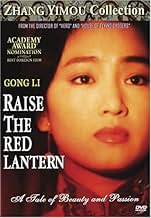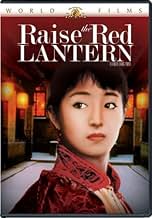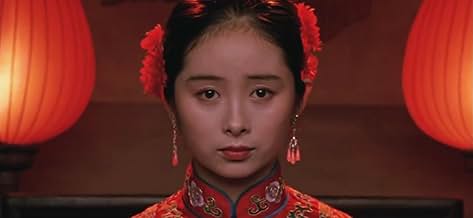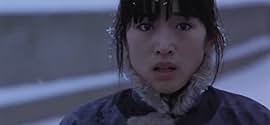NOTE IMDb
8,1/10
37 k
MA NOTE
Une jeune femme devient la quatrième épouse d'un riche seigneur et doit apprendre à vivre avec les règles strictes et les tensions du foyer.Une jeune femme devient la quatrième épouse d'un riche seigneur et doit apprendre à vivre avec les règles strictes et les tensions du foyer.Une jeune femme devient la quatrième épouse d'un riche seigneur et doit apprendre à vivre avec les règles strictes et les tensions du foyer.
- Réalisation
- Scénario
- Casting principal
- Nommé pour 1 Oscar
- 23 victoires et 15 nominations au total
Zengyin Cao
- Old Servant
- (as Zhengyin Cao)
Zhigang Cui
- Dr. Gao
- (as Zhihgang Cui)
Espérance Pham Thai Lan
- Kids - Concubines
- (non crédité)
Avis à la une
10Deidra
In response to the comments that this film is boring, shallow or without a character to identify with: Please study some Chinese history before you make such judgments. The story we see is a visual treat but overlays a much deeper story of China in myriad aspects. Perhaps you are unaware that films and books of the period had to tread lightly on topics that were not merely taboo but could result in danger for all connected. Thus, a slight symbolic representation often took place. Sort of poetic shorthand. Not unlike Chinese art that may seem to be about the season of autumn but is actually about death or change or loss. Nevertheless, any film must stand on its own regardless of the background. This film includes acting scenes that are incredibly forceful and still so gentle. The photography, costumes, sound and music blend into a cinematic work of art. I found the character completely believable, a woman bound in a tradition from which she found no escape except death or madness. And for those who sneer at the opera singer, imagine how the music you enjoy would sound to someone who has a completely different background. Please accept cultural diversity and let your mind and heart be enlarged!
Just another, in a very, very long list of films that document the abuses and misery suffered by women - this time in 1920s China but take a decade of any country and you'll find a plethora of these films. It's a shame that such a huge amount of material exists in the first place, let alone that it continues to this day. That said, the visuals are spectacular, the acting sublime, it is a beautiful thing to behold and the message is well and truly received and understood: we know who is in charge!
10gbheron
"Raise the Red Lantern" is set at a Chinese baronial estate, the time, the 1920s. But, as the family-servant dynamics are placed on display, the viewer begins to feel it could be a thousand years earlier. The story is shown through the eyes of a young college-dropout played by Gong Li. Family misfortune has forced her into concubinage as the "fourth mistress" of the Chinese lord. A headstrong woman, her relationship with the lord's household, especially the other three mistresses, form the basis of the story. But it's telling is as important as the story itself. This is a beautiful, well-acted, well-directed movie. Slow-paced, it ingratiates itself with you, drawing you in deeper and deeper. I can't think of anything that warrants improvement. A masterpiece.
10jonr-3
My interest was maintained throughout every minute of this rather long film. I don't remember when I've seen another film in which every single role was played to perfection. (Incidentally, this wonderfully believable acting seems to occur in at least some, if not most, of the roles in every Chinese movie I see, from the mainland or otherwise.)
The story is one of classical simplicity, in in large part presented with the same classical, clear quality. The interplay of passion, jealousy, and revenge is reminiscent of Shakespeare, but, for me, more entertaining--if it's proper to speak of such ultimately somber and even horrifying subject matter as entertainment.
I unhesitatingly gave a vote of ten, and noticed that a full 33% of voters so far had done the same--very unusual.
When Roger Ebert called "Raise the Red Lantern" "breathtakingly beautiful," he wasn't exaggerating. But beyond its beauty, its moral seriousness, the fact that not for a moment is it "dumbed down" in the regrettable Hollywood fashion, its superb acting, and its almost unbelievably perfect pacing, make it a rare, rare experience.
"Red Sorghum," the only other Zhang Yimou film I've seen so far, I found somewhat propagandistic but gripping and visually stunning (even more so than "Raise the Red Lantern.") I will be making an effort to see more of this director's fairly extensive body of work.
It's a shame major theater chains don't schedule movies of this caliber instead of the torrent of commercialized Hollywood trash they foist on the public, which, alas, seems only too eager to wallow in more and more of it.
The story is one of classical simplicity, in in large part presented with the same classical, clear quality. The interplay of passion, jealousy, and revenge is reminiscent of Shakespeare, but, for me, more entertaining--if it's proper to speak of such ultimately somber and even horrifying subject matter as entertainment.
I unhesitatingly gave a vote of ten, and noticed that a full 33% of voters so far had done the same--very unusual.
When Roger Ebert called "Raise the Red Lantern" "breathtakingly beautiful," he wasn't exaggerating. But beyond its beauty, its moral seriousness, the fact that not for a moment is it "dumbed down" in the regrettable Hollywood fashion, its superb acting, and its almost unbelievably perfect pacing, make it a rare, rare experience.
"Red Sorghum," the only other Zhang Yimou film I've seen so far, I found somewhat propagandistic but gripping and visually stunning (even more so than "Raise the Red Lantern.") I will be making an effort to see more of this director's fairly extensive body of work.
It's a shame major theater chains don't schedule movies of this caliber instead of the torrent of commercialized Hollywood trash they foist on the public, which, alas, seems only too eager to wallow in more and more of it.
Zhang Yimou solidifies his standing as one of cinema's most brilliant craftsmen with Raise the Red Lantern, a heartbreaking and fascinating look into the life of a young, well-educated woman who gives up her future to become the fourth wife of a wealthy landowner in 1920s China. Gong Li, the director's longtime muse, delivers a performance nearly unsurpassed by anyone, male or female, in the 1990s (and many other decades, as well). Her opening close-up is an indelible image of sorrow and resignation capable of drawing tears out of a statue. Zhang Yimou makes films as exquisitely composed as any master's painting, and his palette extends beyond the obvious beauty of Gong Li to include the details of the courtyards, lanterns, silks, and rooftops with an inexplicable mixture of tranquility and austerity.
Le saviez-vous
- AnecdotesFilmed at the Qiao Family Compound near the city of Pingyao. The complex is now open for tours, however, nowhere is there any mention of the film.
- GaffesAround 01:18:59, there is a lot of smoke in front of the third wife. And there is almost no smoke in front of the second one.
- Citations
The Third Concubine: Good or bad, it's all playacting. If you act well, you can fool other people; if you do it badly, you can only fool yourself, and when you can't even fool yourself, you just can fool the ghosts.
Meilleurs choix
Connectez-vous pour évaluer et suivre la liste de favoris afin de recevoir des recommandations personnalisées
- How long is Raise the Red Lantern?Alimenté par Alexa
Détails
Box-office
- Montant brut aux États-Unis et au Canada
- 2 603 061 $US
- Week-end de sortie aux États-Unis et au Canada
- 22 554 $US
- 15 mars 1992
- Montant brut mondial
- 2 603 061 $US
- Durée
- 2h 5min(125 min)
- Couleur
- Rapport de forme
- 1.85 : 1
Contribuer à cette page
Suggérer une modification ou ajouter du contenu manquant


